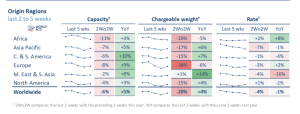Sep 22, 2024
Nigeria’s domestic air cargo industry is facing significant challenges, particularly due to the acute shortage of dedicated cargo aircraft, a situation that has resulted in stunted growth and loss of customers, according to operators in the sector.
Industry stakeholders have voiced their concerns about the dependence on passenger aircraft to transport cargo, which they argue is insufficient to meet the country’s growing air cargo demand. The lack of investment in cargo-dedicated aircraft is also slowing the sector’s expansion and hindering Nigeria’s ability to harness its full potential in the global air freight market.
Critical bottleneck
Lucky Omokhodion, CEO of Ehi Multi Systems Nig. Ltd., highlighted that the current business model, which involves using passenger flights to transport cargo, is unsustainable and limits the growth of the air cargo sector. This reliance has become particularly problematic with recent disruptions, such as the temporary suspension of Dana Air’s operations and operational issues with Arik Air, which brought the air cargo business to a near halt.
“We do not have cargo flights. We only have passenger flights, and it is through these that we take all cargo across the nation,” Omokhodion added. “These limitations have severely impacted the ability to move goods efficiently, leading to delays, losses, and frustrated customers.”
Financial constraints
One of the key reasons behind the lack of investment in cargo-dedicated aircraft is the high capital cost associated with acquiring and operating these specialised planes. Omokhodion pointed out that investors are hesitant to commit to cargo aircraft due to the cost-benefit challenges.
“For a cargo aircraft to fly from Lagos to Abuja, for instance, it needs to be fully loaded with goods for both legs of the trip. If it flies back empty or half-empty, the investor incurs significant losses,” Omokhodion explained. “The result is that potential investors are deterred from entering the market, further contributing to the shortage of cargo aircraft and exacerbating the problem.”
Coordinated improvements
To unlock the full potential of the air cargo industry, stakeholders have called for the establishment of a comprehensive framework for air cargo logistics.
Herbert Odika, Executive Director of Operations at Skyway Aviation Handling Company, outlined how challenges around aviation fuel costs, regulatory hurdles, storage issues and a lack of innovative technology are all slowing progress in the sector.
“Airlines and handlers should give a satisfactory customer experience. Also, good warehousing and storage facilities should be put in place,” Odika outlined.
Fortune Idu, Chairman of the Nigeria Aviation Awards, proposed the creation of a logistics strategy that examines the roles and responsibilities of airports, airlines, cargo handling companies, and government agencies in air cargo distribution. This framework would ensure that all players in the supply chain are operationally ready to meet the growing demand for air cargo services.
“One percent increase in cargo connectivity is associated with a 6.3 percent increase in total exports and imports,” said Idu. This demonstrates the economic potential of strengthening Nigeria’s air cargo infrastructure,” Idu outlined.
The post Nigerian operators call for reforms appeared first on Air Cargo Week.
Go to Source
Author: Ajinkya Gurav
Latest Posts





